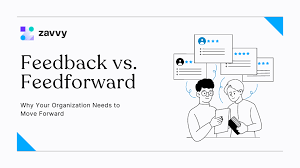
Embracing Feedforward A Forward-Thinking Approach to Workplace Development In an era where the dynamics of work and professional growth are continually evolving, the concept of “feedforward” has emerged as a refreshing alternative to the traditional feedback mechanisms commonly used during job performance reviews. Unlike its retrospective counterpart, feedforward centers on propelling individuals toward future success through constructive and forward-looking solutions. This innovative approach is gaining traction in workplaces, transforming the way managers and employees interact and collaborate on personal and professional development.
Breaking Free from the Past: The Essence of Feedforward
Feedback, as we have known it, often involves a retrospective analysis of past performance. While it certainly has its merits, it can sometimes be limited in its ability to drive growth and improvement. Feedforward, on the other hand, represents a shift in perspective. It’s about setting aside past achievements or failures and instead channeling energy and focus towards future opportunities and development.
Constructive Guidance for Future Success
The core principle of feedforward is to provide employees with actionable and constructive suggestions for improvement. Rather than dwelling on past mistakes or dwelling on accomplishments, feedforward encourages individuals to look forward. Managers and colleagues can offer insights, strategies, and recommendations aimed at helping employees enhance their skills, develop new competencies, and achieve their goals.
Harnessing the Power of Goal Setting
Feedforward integrates seamlessly with the goal-setting process. By offering insights and guidance on setting achievable objectives, employees can map out a clear path toward their professional aspirations. Managers play a crucial role in this by facilitating discussions that enable employees to align their ambitions with organizational goals.
Fueling Career Progression and Development
Career progression discussions can greatly benefit from the feedforward approach. Instead of solely evaluating past performance, employees and managers can engage in conversations that revolve around skill development, mentorship opportunities, and the acquisition of new experiences. This forward-looking approach empowers employees to take charge of their careers and positions them for future success.
Cultivating a Positive and Forward-Looking Work Environment
Incorporating feedforward into the workplace culture can have a transformative effect. It fosters an environment where employees feel valued, supported, and encouraged to grow. By emphasizing solutions and future potential, it contributes to a more positive atmosphere that inspires innovation and collaboration.
Conclusion
As workplaces continue to evolve, so too must the tools and approaches we use to nurture professional growth and development. Feedforward represents a significant departure from traditional feedback, offering a fresh and empowering way for managers and employees to collaborate on personal and career development. By focusing on constructive solutions for the future, setting clear goals, and nurturing career progression, feedforward has the potential to reshape the way organizations approach performance evaluations and employee development. As it gains popularity in forward-thinking workplaces, the concept of feedforward is poised to be a cornerstone in the quest for continuous improvement and success.
Last Updated on: Saturday, September 23, 2023 6:59 am by Anu Priya | Published by: Anu Priya on Saturday, September 23, 2023 6:59 am | News Categories: News, GENERAL
About Us: Business Byte covers a wide range of topics, including India news, business updates, startup insights, technology trends, sports, entertainment, lifestyle, automobiles, and more, led by Editor-in-Chief Ankur Srivastava. Stay connected on Website, Facebook, Instagram, LinkedIn, X (formerly Twitter), Google News, and Whatsapp Channel.
Disclaimer: At Business Byte, we are committed to providing accurate, reliable, and thoroughly verified information, sourced from trusted media outlets. For more details, please visit our About, Disclaimer, Terms & Conditions, and Privacy Policy. If you have any questions, feedback, or concerns, feel free to contact us through email.
Contact Us: businessbyteofficial@gmail.com || ankursri983@gmail.com